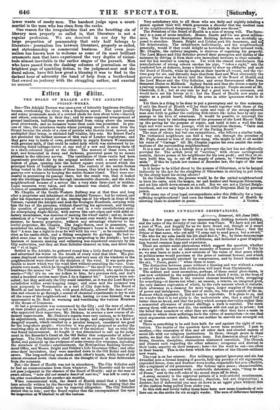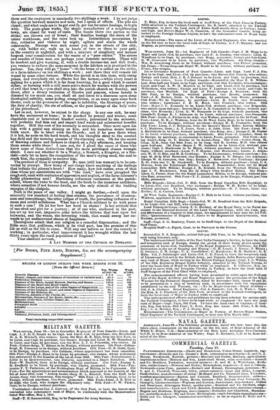SOME UNWELCOME OBSE - HVA.TIONS.
Somerset, Alla June 1855.
Six—A few years ago we were unconsciously drifting towards idoldtry, and the name of the divinity of our choice was Peace. We have not yet had. a year of War, and happily for us we have found out, though at a smart cost, that there are better things even in this world than Peace ; that the Prince of that name, who yet said "I come not to send peace, but a sword," "He who for my sake 'meth his life shall find it," &c., by those deep sayings warned men from the delusions of selfishness, and indicated a goal of aspira- tion beyond common hope and experience. There are certain social phenomena which suggest the question, whether a state of strife be not an inherent necessity of human nature ? If this be so, we may learn to make a new estimate of the value of that pease which tint morals some would purchase at the price of national honour, and %which ls is generally attained by compromises, and by forced iteration of the cry, " Peace, peace !" when there is none.
The distinction between peace without a blessing and war without a curse is one of the last lessons that civilization will learn from Christianity.
The saddest and most anomalous, perhaps, of these social phenomena, is just now exhibited in the neighbourhood from which I write, in the 'form of a collier's strike. There is the natural element breaking forth, struggling for something—it knows not what ; au unseen, a remote, an imagined goods the only distinct expression of which, by the rude natures which it disturbs, finds utterance in a clamour for more wages, larger supplies of the means of power and indulgence. This sort of strife, we, who are outside of the in- fluences which engender it, find it easy to reprobate. It is plain to ins and we wonder that it not plain to the malcontents also that a small loaf is better than no bread, and that the policy which accepts starvation rather than a commuted allowance of sixteen shillings a week is suicidal. The meek among them will starve and die, the reckless will riot and go to prison; but the belief that -somehow or other they are right—that they have a cause in relation to which their sufferings have the virtue of martyrdom—is one that stock arguments cannot shake, that can neither be starved nor scourged out of them. There is something to be said here both for and against the right of con- tention. The depths of the question have never been sounded. I pass to another,—the connexion of this and all other dark and clouded aspects of social life with our religious institutions. In these, though peace is their motto, we find the devil of dissension busy. But dissension about what ?— forms, theories, discipline, abstractions misnamed essentials. The Church and Dissent each regarding the other askance; arrogance and distrust in their looks asperity on their tongues ; hate—let the word be out—too often in their hearts. This is the form which-the warfare of the Church-militant now wears. The rust is on her armour. Her militancy against ignorance and sin has dwindled into a formal keeping of guards, field-day parades of old arguments, expended forces, time and weather-worn truths, respectable but non-effective, like a regiment of old pensioners. She fattens upon peace ; chameleonlike, she eats the air, crammed with comfortable delusions; says, "Sing to ma of Peace," and to the soft echo of the sound drops off to sleep.
A smug serenity is the approved pattern of a well-ordered countenance. You may be bitter, but not vehement ; dissolute, but not disputatious ; a doubter, hut if deferential you may sit down in an upper place without fear of the cushion being pulled from under you.
In-this-rich and lovely valley there-have been now somehundredsof col- here out an the strike for six or eight weeks. The aunt of difference between them and the employers is nominally two shillings a week. I do not judge the question between masters and men, but I speak of effects. The pits are closed ; and what coals are to be got coat 2s. per ton for extra haulage, to begin with. The plate-glass works, the staple manufacture of a neighbouring town, are closed for want of coals. The hands there (no parties to the strike) are thrown out of bread ; their families besiege the doors of the union workhouse, and the rates look up. Intimidation processions by day, robberies and violence by night, agitate and alarm the whole community. Strange wan men accost you in the streets of the city, or, with bolder air, walk up in knots of two or three to your gate, in the country at nightfall, and with a mixture of simplicity and menace bespeak your consideration for the wants of a "poor collier." The sisters and cousins of these men are perhaps your domestic servants. These will be insolent and give wnming, if, with a double income-tax and dull trade, you venture to enforce the saraeoctonoury in the kitchen as is practised in the parlour. Yee, they will go "home "—to the home of & collier ow the strike, or a farm-labourer on ten shillimis a week ; and there they will remain till wooed by some other fortune. While the parish is in this state, with rising prices, and everybodyout at elbows but the farmer,—while every heart is sighing for a peace w tab it is far from knowing, for a good which it cannot define, or burning. with a still more active desire for warfare with the powers of evil that beset at, —you shall step into the parish-church on Sunday, and there, after a dreary recitation of litanies and prayers, whose beauty is dimmed by too much use, you shall alt and listen to a discourse upon some theological snlitilty, some puling evangelicism, or an essay upon some hack theme, such as the proneness of the age to infidelity, the blessings of peace, the duty of charity, the sin of schism, or the pure lineage of the holy order of the priesthood. Let us not, however, be unjust to the clergy. Is any one sick, he-may have the sacrament at home ; is he pinched by penury and winter, some charitable coal or benevolent blanket society, patronized by the minister, will probably find him out and impart kind words and substantial benefits together. Still the root of his necessity is untouched. Once more upon his legs with a genial sun shining on him, and his nameless desire breaks forth anew. He is blase with the Church; and if he goes there when it is hot, he node on his hard bench, and his thoughts stray to the scented hay-field and the teeming promise of theeipening .corn. Oh for the secret of drawing colliers and farmers to church on a,July afternoon, and keeping them awake while there ! i care mot, for I plead the cause of those who know none of those distinctions that the more privileged classes wrangle about. I care not whether it be a Wesley, a Bennett, a Kingsley, or a Sin- clair—only let us have the recognition of the man's crying need, the zeal to reach 'him,. the sympathy to recover him. The greatest of these is sympathy. No man (still less -woman) is to be con- verted by precept. How many of our clergy know anything of the feelings that inflame the pitman's heart ? How many, haw few rather, even of that class whose pet associations are with "the land," have ever ploughed the rough soil, rank with centuries of oppremionand neglect, of the farm-labourer's feebly glimmering soul ! Hardening influences . commence at the -parish- school, where the ruler to the head, and thehirch to the nameless antithesis, where sensation if not honour dwells, are the only stimuli of the budding energies of the clodpole..
Suol is the peace of our valley. I might go Iurther,—dwell upon the miserably low standard of feeling that obtains, the prevalence of drunken- ness mid iionenbinage; the utter eclipse of truth, the pervading influence of a mean and sordid selfishness. What has a Church-militant to do with peace in such a ease ? Oh let her bow her head in shame ! Is her attitude that of one shod and girt for a journey ; or of one who, anchored in the past, has set up her rest, impassive alike before the billows that beat upon her bulwarks, and the winds, the favouring winds, that -would sweep her -on- wards to yet undiscovered shores of happiness. Theologians admit that nur religion is a remedial dispensation.; and the
Bible says that godliness, which is its vital part, has the promise of this life-as -well as the life to come. Will any one inform us how the remedy is working'; in particular, what improvement it has wrought within the last thirty years upon the rural population.of England ?
Your obedient servant,
A LILY MEMBER. OF THE CHURCH OF FefeJIANTt.



































 Previous page
Previous page